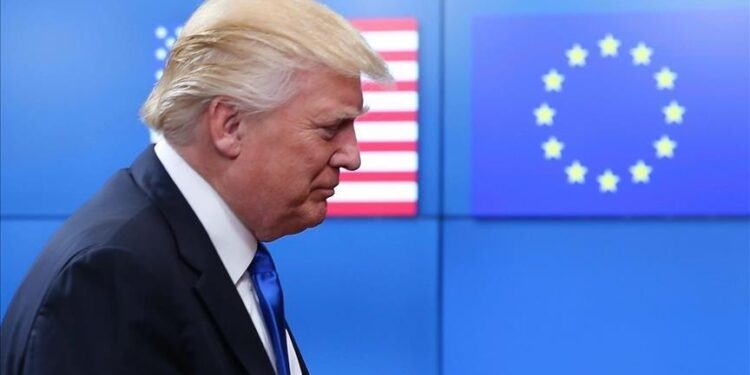- The transatlantic relationship as we know it is probably going to be extremely challenging,’ says expert from EUISS
- ‘The United States is likely to shift its focus towards its territorial defense and the deterrence of China in the Asia-Pacific,’ says Giuseppe Spatafora
- It “will be very difficult for EU to act and it’s because, for one simple reason, that Trump doesn’t like the EU as such, ‘ says another expert
BRUSSELS
As Donald Trump, known for his anti-European Union (EU) stance, takes office in the US, experts believe that Brussels must keep communication channels open with Washington and maintain transatlantic relations based on mutual interests, particularly in the areas of defense, trade, and support for Ukraine.
Trump, who caused tensions in the traditional Washington-Brussels partnership during his first term, assumed office yesterday as the 47th President of the US.
While preparing for potential crises during Trump’s second term, on issues ranging from defense to trade, the EU leadership has also expressed hopes for fostering positive relations, sending optimistic messages at every opportunity.
Following Trump’s inauguration last evening, all top EU officials shared congratulatory messages, expressing hope for a continued partnership.
Challenges for EU
Giuseppe Spatafora, a transatlantic relations expert at the European Union Institute for Security Studies (EUISS), told Anadolu that defense and trade would be the key areas where EU-US relations will be mosr tested.
Describing the current security environment as “the worst security situation that the EU has potentially ever faced,” Spatafora underscored the importance of alliances, and maintaining friendly relations with the US.
“The transatlantic relationship as we know it is probably going to be extremely challenging, changing from a partnership between like-minded actors sharing similar values to an interest-based one,” he said.
However, he argued that these shared interests, particularly in defense, are not entirely misaligned.
“Probably the United States is going to priorirtize territorial defense and the deterrence of China in the Asia-Pacific. But this doesn’t necessarily mean the abandonment of Europe,” he explained.
“In the complex security environment it faces today, the United States will probably have to pick and choose their battles, and at the same time, they’ll think about their own reindustrialization,” Spatafora added. “This means that the Europeans will need to pull up their own weight and spend more for their own defense, to support Ukraine and deter Russia.”
On defense, he added, “Europeans have already begun increasing their defense spending, aligning with mutual interests. If Europeans spend more on defence, they will be taken more seriously in Washington. Continuing the relationship with the US, despite tensions, is essential.”
Tensions in trade
In the realm of trade, Spatafora noted that the EU is in a stronger position than in defense.
However, he warned of potential clashes with the new administration, which has threatened to impose tariffs.
“In the trade dimension, obviously the EU is a stronger actor, but it’s also one area which there’s probably going to be clashes with the new administration, which has threatened to impose tariffs. Trump may start not with Europe. It might start with Mexico, Canada or China,” he remarked. But Europeans must be ready for all possibilities, including a potential 10% tariff on all goods.
Ukraine and peace negotiations
Ondrej Ditrych, a senior analyst at EUISS specializing in Russia and Eastern Neighborhood policies, highlighted the EU’s concerns about Trump’s stance on supporting Ukraine amid its war with Russia.
“My sense is that the EU’s support is likely to continue, it is important for Ukraine’s defenses. This includes military material. It also includes training of Ukrainian units that participate in the defense.
“But of course, there are certain critical capabilities that I mentioned, that are being provided by the US, and in the very short term, these would be very hard to substitute, but it is still kind of, I would say, an ongoing task for the EU to be aware of what these are and have a plan how to make up for the US support over time,” Ditrych told Anadolu.
He also pointed to differences in how the EU and Trump might approach peace in Ukraine.
“If there is, let’s say, some sort of a bad deal on Ukraine, then that will only increase the chance that Russia will break the deal. And this is not certainly in the US interest,” he said, adding the new US administration appears keen on enforcing some form of truce or peace agreement.
Dealing with Trump through NATO chief
Juraj Majcin, an analyst at the European Policy Centre, highlighted the challenges the EU faces under Trump.
It “will be very difficult for the EU to act and it’s because, for one simple reason, that Trump doesn’t like the EU as such,” he told Anadolu.
Majcin noted that Trump, who previously pressured Europe to increase defense spending, now demands allies allocate 5% of GDP to defense.
While Europe has made significant progress in defense spending compared to the first Trump administration, Majcin argued that conveying this progress to the US remains a challenge.
Majcin suggested that the EU leverage NATO and figures like NATO Secretary-General Mark Rutte, who he described as “Trump’s whisperer.”
Rutte is “also very straightforward on the European level. He’s not afraid of saying that alliance should spend more so,” he said.
“I would recommend EU to work in cooperation with NATO … and Mark Rutte,” he added.
Majcin also warned of the “Elon Musk factor,” stating that the Trump administration, with support from influential figures like Musk, may attempt to exploit divisions within Europe by backing far-right movements to extract concessions from the EU.






